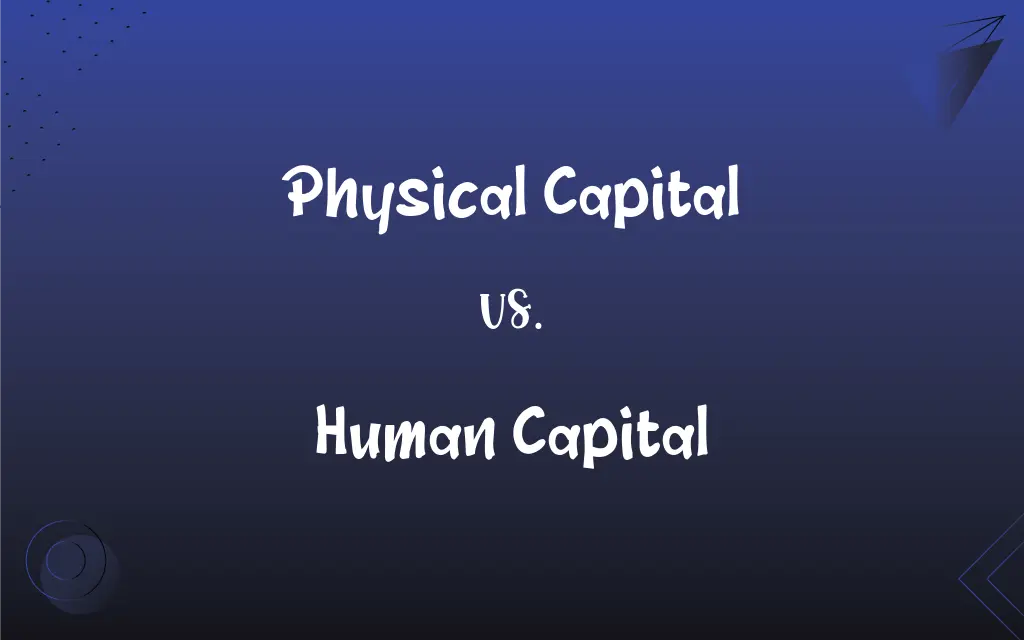Physical Capital vs. Human Capital: What's the Difference?
Edited by Aimie Carlson || By Harlon Moss || Updated on October 20, 2023
Physical capital refers to tangible assets aiding production, while human capital pertains to skills, knowledge, and experience within individuals.

Key Differences
Physical capital and human capital, both critical economic concepts, differ fundamentally in nature and composition. Physical capital encompasses tangible assets like machinery, buildings, and equipment, all of which aid in the production of goods and services. In contrast, human capital relates to the knowledge, expertise, training, and skills inherent in people, which enhance their productivity and earning potential.
Physical capital typically requires a financial investment and often undergoes depreciation over time due to wear and tear. For instance, a manufacturing plant's machinery, as part of its physical capital, may need regular maintenance or replacement. Human capital, on the other hand, grows with education, training, and experience, elevating an individual's or a workforce's value.
The accumulation and improvement of physical capital can lead to increased output and efficiency. Investing in new technology or advanced machinery can boost production capabilities. Meanwhile, human capital enhancement through education and training can result in improved innovation, efficiency, and overall productivity of the workforce.
Both forms of capital contribute indispensably to economic growth. While physical capital can significantly impact immediate production capacity, human capital has long-term implications, influencing innovation, adaptability, and the sustainable growth of an economy.
Moreover, although physical capital can be easily traded or transferred, human capital is inherently tied to individuals. The value of physical capital, such as a factory or computer, can be quantified monetarily. In contrast, human capital's worth, though immensely significant, can be more challenging to measure in precise monetary terms.
ADVERTISEMENT
Comparison Chart
Nature
Tangible assets
Skills, knowledge, experience
Investment & Growth
Financial investment; depreciates over time
Grows with education, training, experience
Measurement
Often quantified monetarily
Difficult to measure monetarily
Transferability
Can be traded or transferred
Inherently tied to individuals
Examples
Machinery, buildings, technology
Education, expertise, training
ADVERTISEMENT
Physical Capital and Human Capital Definitions
Physical Capital
Assets that depreciate over time.
The company's physical capital, including its machinery, needed regular maintenance.
Human Capital
The collective skills, knowledge, and experience of individuals.
The company's human capital was its biggest asset.
Physical Capital
Requires financial investment.
To expand their operations, they invested heavily in physical capital.
Human Capital
Tied inherently to individuals.
The firm valued the unique human capital each employee brought to the table.
Physical Capital
Can be traded or sold.
The firm decided to sell some of its physical capital to raise funds.
Human Capital
Increases with education and training.
Investing in the human capital of employees leads to greater innovation.
Physical Capital
Tangible assets used in production.
The factory invested in new physical capital to increase its output.
Human Capital
Enhances workforce productivity.
The high level of human capital in the team resulted in exceptional performance.
Physical Capital
Boosts immediate production capacity.
With the addition of the latest physical capital, the production doubled.
Human Capital
Crucial for long-term economic growth.
Nations with a rich human capital tend to have sustainable economic growth.
FAQs
Does physical capital depreciate?
Yes, physical capital typically depreciates over time due to wear and tear.
How does one enhance human capital?
Human capital grows with education, training, experience, and health improvements.
Which capital requires financial investment?
Physical capital requires direct financial investment, like buying machinery.
Is human capital transferable like physical capital?
No, human capital is inherently tied to individuals and isn't easily transferable.
What does physical capital encompass?
Physical capital includes tangible assets like machinery, equipment, and buildings used in production.
Why is human capital essential for economies?
Human capital drives innovation, productivity, and sustainable economic growth.
How does physical capital impact production?
Physical capital can significantly enhance immediate production capacity.
Can physical capital be rented or leased?
Yes, physical capital like machinery or buildings can be rented or leased.
Is human capital a renewable resource?
Yes, human capital can be renewed and enhanced through continuous learning and experience.
Why is measuring human capital complex?
Human capital involves intangible elements like knowledge and experience, making precise valuation challenging.
Can physical capital be easily transferred?
Yes, physical capital like machinery or buildings can be traded or transferred.
How does human capital contribute to personal income?
Higher human capital often correlates with higher earnings and better job opportunities.
How do companies typically enhance their human capital?
Companies invest in training programs, education, and health initiatives for employees.
Is the value of physical capital stable over time?
No, physical capital often undergoes depreciation and may require maintenance or replacement.
Do both forms of capital contribute to GDP?
Yes, both physical and human capital are essential contributors to a nation's GDP.
Is there a limit to enhancing human capital?
While there might be practical limits, theoretically, human capital can continuously be enhanced through lifelong learning.
How does human capital differ from physical capital?
Human capital pertains to the skills, knowledge, and experience of individuals, while physical capital involves tangible production assets.
Can we quantify human capital monetarily?
Though invaluable, human capital is challenging to measure in precise monetary terms.
What's an example of a country's physical capital?
Infrastructure like roads, bridges, and airports are examples of a country's physical capital.
Can nations trade human capital?
Indirectly, through immigration and emigration, nations can "gain" or "lose" human capital.
About Author
Written by
Harlon MossHarlon is a seasoned quality moderator and accomplished content writer for Difference Wiki. An alumnus of the prestigious University of California, he earned his degree in Computer Science. Leveraging his academic background, Harlon brings a meticulous and informed perspective to his work, ensuring content accuracy and excellence.
Edited by
Aimie CarlsonAimie Carlson, holding a master's degree in English literature, is a fervent English language enthusiast. She lends her writing talents to Difference Wiki, a prominent website that specializes in comparisons, offering readers insightful analyses that both captivate and inform.






































































